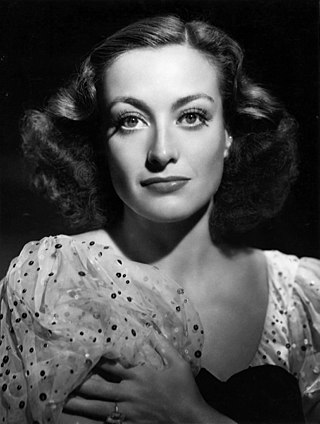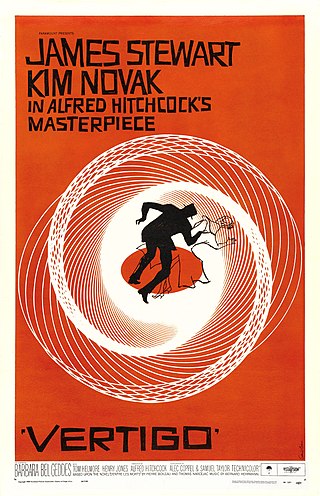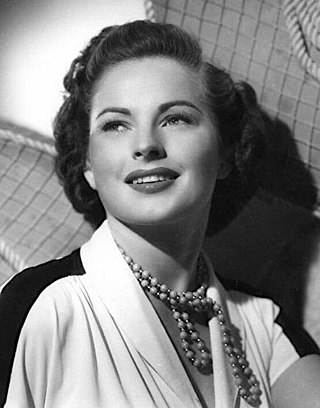Related Research Articles

Sir Alfred Joseph Hitchcock was an English film director. He is widely regarded as one of the most influential figures in the history of cinema. In a career spanning six decades, he directed over 50 feature films, many of which are still widely watched and studied today. Known as the "Master of Suspense", Hitchcock became as well known as any of his actors thanks to his many interviews, his cameo appearances in most of his films, and his hosting and producing the television anthology Alfred Hitchcock Presents (1955–65). His films garnered 46 Academy Award nominations, including six wins, although he never won the award for Best Director, despite five nominations.

Joan Crawford was an American actress. She started her career as a dancer in traveling theatrical companies before debuting on Broadway. Crawford was signed to a motion picture contract by Metro-Goldwyn-Mayer in 1925. Initially frustrated by the size and quality of her parts, Crawford launched a publicity campaign and built an image as a nationally known flapper by the end of the 1920s. By the 1930s, Crawford's fame rivaled MGM colleagues Norma Shearer and Greta Garbo. Crawford often played hardworking young women who find romance and financial success. These "rags-to-riches" stories were well received by Depression-era audiences and were popular with women. Crawford became one of Hollywood's most prominent movie stars and one of the highest paid women in the United States, but her films began losing money. By the end of the 1930s, she was labeled "box office poison".

Vertigo is a 1958 American psychological thriller film directed and produced by Alfred Hitchcock. The story was based on the 1954 novel D'entre les morts by Boileau-Narcejac, with a screenplay by Alec Coppel and Samuel A. Taylor. The film stars James Stewart as a former San Francisco police detective who has retired after an incident in the line of duty caused him to develop an extreme fear of heights accompanied by vertigo. He is hired as a private investigator to report on the strange behavior of an acquaintance's wife.

Les Diaboliques is a 1955 French psychological horror thriller film co-written and directed by Henri-Georges Clouzot, starring Simone Signoret, Véra Clouzot, Paul Meurisse and Charles Vanel. It is based on the 1952 novel She Who Was No More by Pierre Boileau and Thomas Narcejac.

Alma Lucy Reville, Lady Hitchcock was an English screenwriter and film editor. She was the wife of film director Alfred Hitchcock. She collaborated on scripts for her husband's films, including Shadow of a Doubt, Suspicion, and The Lady Vanishes, as well as scripts for other directors, including Henrik Galeen, Maurice Elvey, and Berthold Viertel.

Olympia Dukakis was an American actress. She performed in more than 130 stage productions, in some 60 films, and in approximately 50 television series. Best known as a screen actress, she started her career in theater. Not long after her arrival in New York City, she won an Obie Award for Best Actress in 1963 for her off-Broadway performance in Bertolt Brecht's Man Equals Man.

Ida Lupino was a British actress, director, writer, and producer. Throughout her 48-year career, she appeared in 59 films and directed eight, working primarily in the United States, where she became a citizen in 1948. She is widely regarded as the most prominent female filmmaker working in the 1950s during the Hollywood studio system. With her independent production company, she co-wrote and co-produced several social-message films and became the first woman to direct a film noir, The Hitch-Hiker, in 1953.

Rebecca is a 1940 American romantic psychological thriller film directed by Alfred Hitchcock. It was Hitchcock's first American project, and his first film under contract with producer David O. Selznick. The screenplay by Robert E. Sherwood and Joan Harrison, and adaptation by Philip MacDonald and Michael Hogan, were based on the 1938 novel of the same name by Daphne du Maurier.

Ella Wallace Raines was an American film and television actress active from the early 1940s through the mid-1950s. Described as "sultry" and "mysterious", the green-eyed star appeared frequently in crime pictures and film noir, but also in drama, comedy, Westerns, thrillers, and romance.

Edgar Georg Ulmer was an Austrian film director who worked mainly in Hollywood B movies and other low-budget productions, eventually earning the epithet 'The King of PRC', due to his extremely prolific output for the Poverty Row studios. His stylish and eccentric works came to be appreciated by auteur theory-espousing film critics in the years following his retirement. Ulmer's most famous productions include the horror film The Black Cat (1934) and the film noir Detour (1945).

Euzhan Palcy is a French film director, screenwriter, and producer. Her films are known to explore themes of race, gender, and politics, with an emphasis on the perpetuated effects of colonialism. Palcy's first feature film Sugar Cane Alley received numerous awards, including the César Award for Best First Feature Film. With A Dry White Season (1989), she became the first black female director to have a film produced by a major Hollywood studio, MGM.

Phantom Lady is a 1944 American film noir directed by Robert Siodmak and starring Franchot Tone, Ella Raines, and Alan Curtis. Based on the novel of the same name by Cornell Woolrich, it follows a young Manhattan secretary and her endeavors to prove that her boss did not murder his wife.

Coleen Gray was an American actress. She was best known for her roles in the films Nightmare Alley (1947), Red River (1948), and Stanley Kubrick's The Killing (1956).

Lady Beware is a 1987 American thriller film directed by Karen Arthur and starring Diane Lane, Michael Woods and Cotter Smith. It was filmed on location in and around Pittsburgh.

Joan Harrison was an English screenwriter and producer. She became the first female screenwriter to be nominated for the Best Original Screenplay Oscar when the category was introduced in 1940, and was the first screenwriter to receive two Academy Award nominations in the same year in separate categories, for co-writing the screenplay for the films Foreign Correspondent (1940) (original) and Rebecca (1940) (adapted), both directed by Alfred Hitchcock, with whom she had a long professional relationship.

Jamaica Inn is a 1939 British adventure thriller film directed by Alfred Hitchcock and adapted from Daphne du Maurier's 1936 novel of the same name. It is the first of three of du Maurier's works that Hitchcock adapted. It stars Charles Laughton and Maureen O'Hara in her first major screen role. It is the last film Hitchcock made in the United Kingdom before he moved to the United States.
Tamra Davis is an American film, television and music video director.

Virginia Van Upp was an American film producer and screenwriter.
The depictions of women in film noir come in a range of archetypes and stock characters, including the alluring femme fatale. A femme fatale, is a prevalent and indicating theme to the style of film noir.
Janet Dean, Registered Nurse is an American medical drama television series. It was released in February 1954, and it continued to be broadcast in reruns in the early 1960s. It was the first TV series in which the lead was a nurse. By October 1954, the show's title had been changed to The Ella Raines Show "following the lead of other packages that switched to the stars' names to help pull an audience for the package."
References
- ↑ Mystery Writers of America. "All Winners". Edgar Awards Info & Database.
- ↑ "Christina Lane". UM School of Communication.
- ↑ University Film & Video Association. "Association". University Film & Video Association.
- ↑ "Lane, Kenneth Proctor, Jr". W&L ArchivesSpace Public Interface. Washington and Lee Special Collections.
- ↑ "Christina Lane". Authors Answer.
- ↑ Brownstein, Emmalyse. "Film professor shares the inspiration behind 'Phantom Lady'". News@TheU. University of Miami.
- ↑ "Christina Lane". UM School of Communication. University of Miami.
- ↑ Muzii, Beverly. "Edgar Recipient Christina Lane Documents Forgotten Women of the Film Industry". ArtSpeak. Florida International University.
- ↑ Lane, Christina (2000). Feminist Hollywood: From Born in Flames to Point Break. Wayne State University Press. ISBN 978-0814329221.
- ↑ Jenkins, Claire (2022). ""Counter cinema" in the mainstream". Feminist Media Studies. 22 (5): 1179–1194.
- ↑ Cobb, Shelley (2014). Adaptation, Authorship, and Contemporary Women Filmmakers. Springer.
- ↑ Harrod, Mary (May 24, 2021). Heightened Genre and Women's Filmmaking in Hollywood: The Rise of the Cine-fille. Springer International Publishing. pp. 21–76.
- ↑ Butler, Alison (2002). Women's Cinema: The Contested Screen. Wallflower Press.
- ↑ Kiriakou, Olympia (2020). Becoming Carole Lombard: Stardom, Comedy, and Legacy. Bloomsbury Publishing USA.
- ↑ Williams, Linda Ruth; Hammond, Michael (2006). Contemporary American Cinema. McGraw-Hill Education.
- ↑ Lane, Christina (2010). Magnolia (Studies in Film and Television). Wiley-Blackwell. ISBN 978-1405184625.
- ↑ Leamer, Laurence (2023). Hitchcock's Blondes: The Unforgettable Women Behind the Legendary Director's Dark Obsession. Penguin.
- ↑ Miller, Henry K. (2022). The First True Hitchcock: The Making of a Filmmaker. University of California Press.
- ↑ Modleski, Tania (2011). 'Suspicion: Collusion and Resistance in the Work of Hitchcock's Female Collaborators' in A Companion to Alfred Hitchcock. Wiley-Blackwell. pp. 162–180.
- ↑ Morris, Nathalie (2020). "The Forgotten Women Behind Hitchcock". Hitchcock Annual. 24 (1): 128–137.
- ↑ Stamp, Shelley (2020). "Film noir's 'gal producers' and the female market". Women's History Review. 29 (5): 801–821.
- ↑ Maltin, Leonard. "NEW AND NOTABLE BOOKS – MARCH 2020". Leonard Maltin's Movie Crazy.
- ↑ "Phantom Lady". Kirkus Reviews.
- ↑ Bartell, Gerald. "'Phantom Lady' review: Spotlighting the woman genius behind Hitchcock". Newsday. Newsday.
- ↑ McCarthy, Todd. "Todd McCarthy: Norman Lloyd Knows From Epidemics". Deadline. Deadline.
- ↑ Schaub, Michael (2021-07-19). "Agatha Award Winners Are Revealed". Kirkus Reviews. Archived from the original on 2022-12-25. Retrieved 2022-12-25.
- ↑ Baars, Bill; Dar, Mahnaz; Thornell, Peter. "Best Arts Books of 2020". Library Journal.
- ↑ "Flipping the Hitchcock Script". airmail.news. Retrieved Oct 6, 2024.
- ↑ Lane, Christina (Oct 28, 2021). "#TimesUp: Hollywood's Lack of Progress and Failure to Believe In All Women". Ms. Magazine. Retrieved Oct 6, 2024.
- ↑ "Christina Lane" . Retrieved Oct 6, 2024.
- ↑ "THE WOMEN BEHIND HITCHCOCK". Film Forum.
- ↑ Hudson, David. "The Women Behind Hitchcock". The Criterion Collection.
- ↑ Baker, Neil. "NEWS – Studiocanal announces the release of a brand new 4K restoration of Circle of Danger". Cinerama. Cinerama Film UK.
- ↑ Noir Fan (not affiliated with Eddie Muller or TCM). "Noir Alley: They Won't Believe Me (1947) intro 20200927". YouTube.
- ↑ Noir Fan (not affiliated with Eddie Muller or TCM). "Noir Alley: The Strange Affair of Uncle Harry (1945) intro 20210103". YouTube.